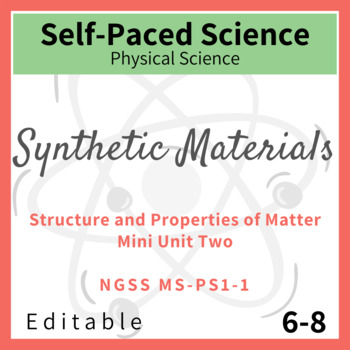Synthetic Materials Mini Unit for Middle School Chemistry NGSS MS-PS1-3
- Google Drive™ folder

What educators are saying
Also included in
- This complete structure and properties of matter unit has everything you need to teach three NGSS MS-PS1 standards including editable student Slides, worksheets, hands-on investigations, final projects and extension activities. Topics covered include atoms, elements, the periodic table, synthetic mPrice $44.99Original Price $54.96Save $9.97
- This bundle includes everything you need to teach all NGSS physical science standards in middle school for the entire year and works for both self-pacing and traditional classes! Topics covered include energy and matter; conduction, convection and radiation; potential and kinetic energy; force andPrice $229.00Original Price $259.82Save $30.82
Description
This synthetic materials mini unit has everything you need to teach NGSS MS-PS1-3 including editable student Slides, worksheets, hands-on investigations, a final project and extension activity. Topics covered include natural vs synthetic materials, positive and negative impacts, making slime and more! If you want to decrease stress for yourself and your students and help kids make personal connections to the science they are learning, try this self-paced synthetic materials mini unit!
Students differentiate between natural and synthetic materials and make their own synthetic slime! They research the environmental, economic and societal impacts of two synthetic materials - plastic and high fructose corn syrup. Then, students decide if the positive impacts of HFCS outweigh the negative impacts and argue their point.
Extension activities include researching one synthetic material of their choice that students simply can’t live without!
We use scientific language in context with photographs and graphics to make our lessons accessible to readers of all levels. Students make personal connections to the science they learn and enjoy our highly engaging authentic assessments.
Our lessons are written to make self-pacing as simple as possible and also work in a traditional classroom.
When you purchase this product, TpT will copy these files directly to your Google Drive:
→ Teacher outline (PDF)
→ Student slides (Google Slides)
→ Student packet (Google Docs) with answer key (PDF)
→ Summative assessment with rubric (Google Docs)
→ Extension activity slides (Google Slides)
→ Extension activity with student rubric (Google Docs)
All Google Docs and Slides are editable to better meet your specific needs.
Materials needed for this unit are listed below and can be easily modified for what you have on hand:
- 1:1 technology OR printed copies of student slides and packet for each student
- Samples (or pictures) of cotton, nylon, leather, rubber on shoes, maple syrup, sugar, Splenda
- White glue, food dye, liquid starch, mixing bowl, small bags
- Honey, corn syrup, packaged foods and drinks with honey or corn syrup listed as ingredients
- Calcium chloride, beaker, graduated cylinder, sodium alginate, water bottle, small cups, measuring spoons (for demo)
Why would I want to self-pace my science class?
If you are tired of cramming learning into perfect 48 minute chunks or filling that extra 10 minutes of class with busy work or if your students get stressed when the bell rings as they rush to finish a lab, then self-pacing is for you!
Self-pacing creates a relaxed, stress-free learning environment for both students and teachers and supports everyone’s social and emotional needs.
Teachers trade whole class lectures for one-on-one conversations and students spend their time doing science at the pace that is right for them!
Our self-paced science lessons foster independence and higher order thinking while providing many opportunities for students to practice science and engineering skills. The three dimensions of NGSS (science and engineering practices, crosscutting concepts, disciplinary core ideas) are embedded throughout our lessons and units.
This mini unit is a part of the Structure and Properties of Matter bundle and the Physical Science for Middle School NGSS Complete Curriculum.
You might also be interested in these Self-Paced Science products:
- Science Fair (National Geographic): Viewing Guide and Project
- Heat Energy Transfer Mini Unit
- The Water Cycle Mini Unit
Visit our Self-Paced Science store to view all of our products.
Copyright © Self-Paced Science. All rights reserved.
Permission to copy for single classroom use only.
Please purchase additional licenses if you’d like to share this product.






